AR, robotics and cataracts: how we went to the Russian-German programming school
In mid-March, Joint Advanced Student School 2019 (JASS), a weekly English-language student hackathon ++ software development school, took place in Munich. About her in 2012 already wrote on Habré . In this post we will tell about the school and share impressions of several students "first-hand".
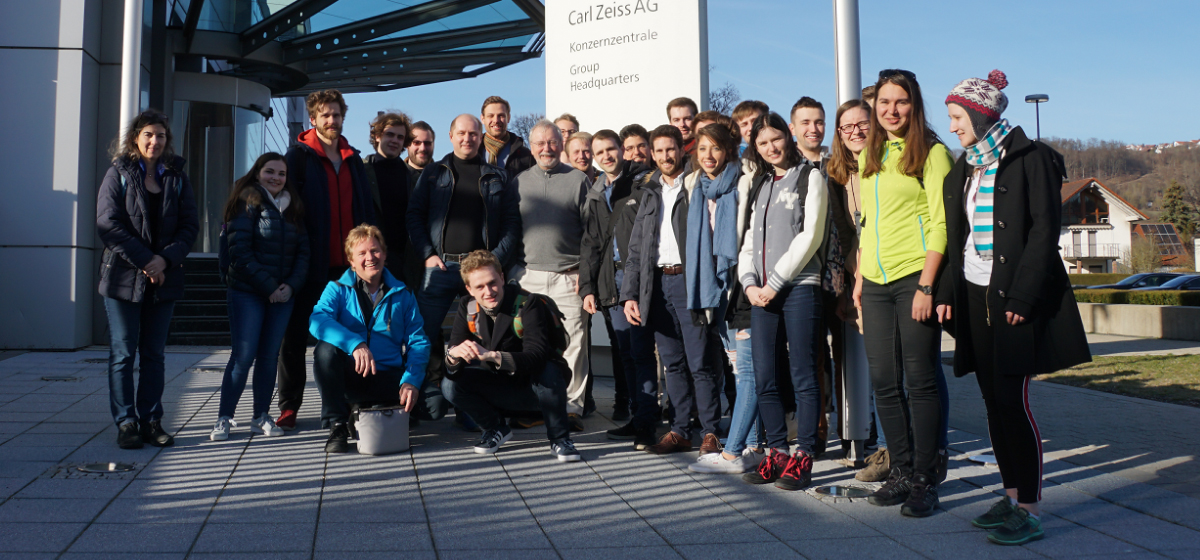
Each year, the sponsoring company (this year - Zeiss) offers ~ 20 students from Germany and Russia several projects, and after a week the teams must present their achievements in these areas. This year, it was necessary either to make video calls with augmented reality for Android, or to invent and test the UI for the predictive maintenance system, or to participate in the secret Project Cataract.
')
All work is in English. The organizers purposely make up mixed teams of Russian and German students for (bes) cultural exchange. Moreover, in even years the school takes place in Russia, and in odd years - in Germany. So this is a great opportunity for students of varying degrees of preparation to get not just work experience, but experience of working with foreigners.
Every year the school has a sponsor company that provides projects and mentors for students. This year it was the company Zeiss, which is engaged in high-precision optics (but not only!). At the beginning of the week, representatives of the company (“customers”) presented the participants with three projects for implementation, after which the students broke up into teams and during the week did a proof-of-concept.
The goals of the school are cultural exchanges between students and the opportunity to give novice programmers experience in real-world projects. At school, you do not need to get a fully finished application, the process is more like R & D: all projects are related to the company's activities, and you want to get a proof-of-concept, and such that it is not a shame to show it to managers within the company.
The main differences from the hackathon are: more time to develop, there are excursions and other entertainment, but there is still no competition between the teams. As a result, there is no goal to "win" - all projects are independent.
In each team, in addition to students from different countries, there was also a “leader” - a graduate student who managed the team, distributed tasks and radiated knowledge.
In total, three projects were proposed , each of them will be told by HSE students - St. Petersburg, who are included in the project.
Nadezhda Bugakova (1 course of the magistracy) and Natalya Murashkina (3 year undergraduate): We needed to port the video application with augmented reality on Android. Such an application was made as part of another monthly hackathon for iOS and HoloLens, but there was no version for Android. This can be useful for joint discussions of any designed parts: one person turns the virtual part and discusses with the rest.
Vsevolod Stepanov (1 course of the magistracy): There are expensive robots in production, which are expensive to maintain for maintenance, but repair is even more expensive. The robot is hung with sensors and I want to understand when it makes sense to stop maintenance - this is just a predictive maintenance. You can use machine learning for this, but it takes a lot of markup data. We also need experts who can understand anything on the charts. Our task was to make an application that highlights the alleged anomalies in the data from the sensors and allows the expert and the data scientist to look at them together, discuss and correct the model.
Anna Nikiforovskaya (3 bachelor course): unfortunately, we were asked not to disclose details of the project. The description and presentation was even removed from the TUM site , where the rest of the projects are located.
The school is small and lamp-based: this year about twenty students of various degrees of training participated in the JASS: from the first year of undergraduate to the graduate. Among them were eight people from the Munich Technical University (TUM), four students from the St. Petersburg HSE campus, four more from the ITMO University and one LETI student.
All the work is in English, the teams are specially almost equally composed of German-speaking and Russian-speaking guys. There is no interaction between the projects, except that at the dinner all mixed up. Inside the project, synchronization through Slack and a physical board on which you can glue pieces of paper with tasks.
Schedule for the week looked like this:
Nadezhda Bugakova (1st year of graduate school): Our working day was like this: in the morning we come and stand up, that is, everyone tells what they have done in the evening and plan to do it in the afternoon. Then we work, after lunch - another standap. Very encouraged the use of boards with pieces of paper. Our team was more than the others: seven students, a leader, plus we often had a customer hanging out (he could ask questions on the subject area). Often we worked in pairs or even triples. We also had a person who developed the original iOS application.
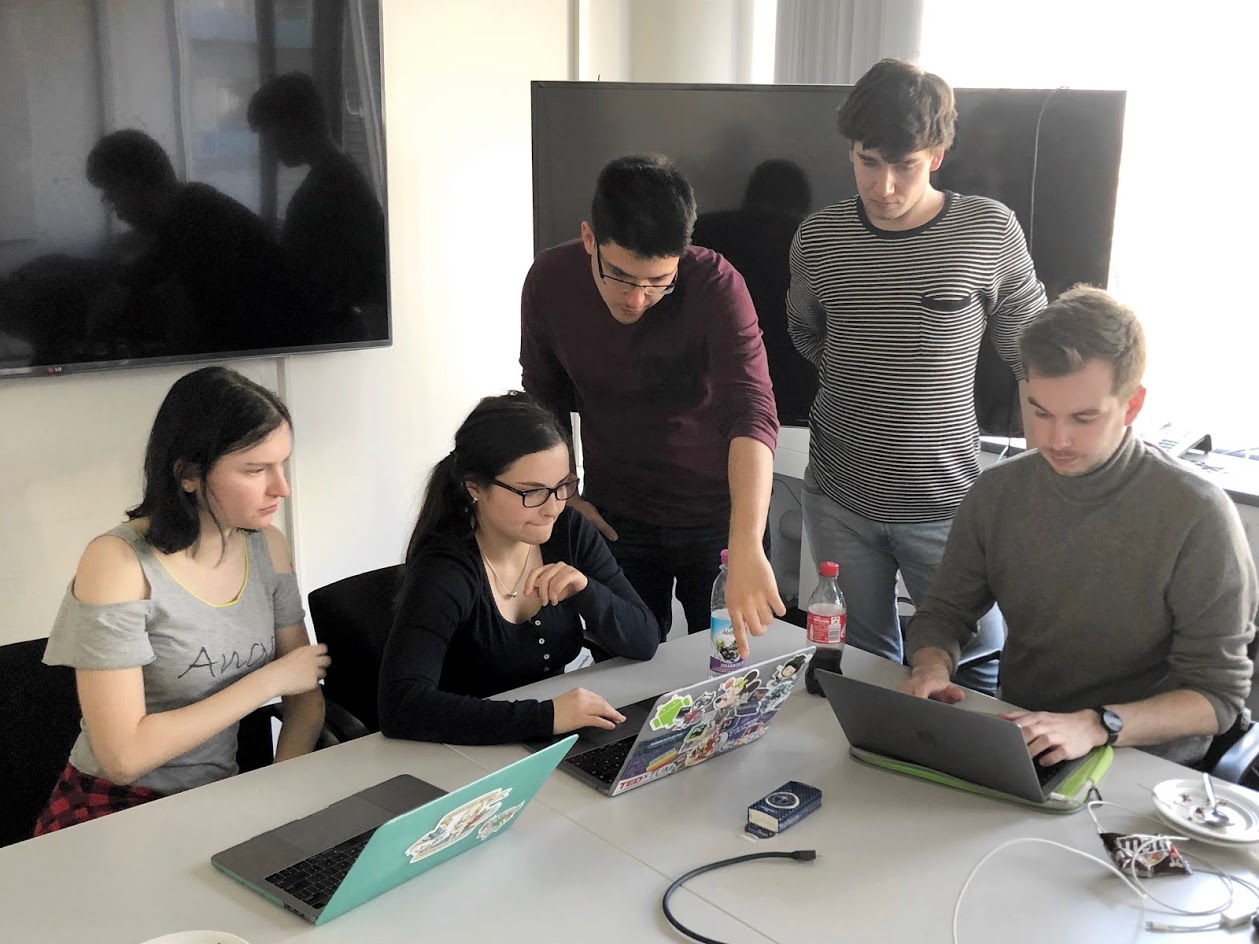
Vsevolod Stepanov (1 course of the magistracy): In a sense, SCRUM was used: one day - one sprint, two stand-ups per day for synchronization. Participants had mixed opinions on effectiveness. Some (including me) thought it was too much talk.
On the first day after the presentations, we discussed the plan, communicated with the customer, tried to figure out what to do. Unlike the Nadi team, the customer did not interact with us during the project. And the team was smaller - 4 students.
Anna Nikiforovskaya (3rd year undergraduate course): In fact, the rules in teams are not exactly that strictly followed. Initially, we were given a lot of instructions on holding stand-ups, a la: everything in a circle, always standing, saying “I promise”. In reality, my team did not adhere to strict rules and stand-ups were carried out not because it is necessary, but because there are many of us, and we need to understand who does what, synchronize efforts, and so on. I had a feeling that we had a natural discussion of progress and the project.
In my project, the customer understood nothing about programming, but understood only in optics. This turned out to be very cool: for example, he explained to us what the brightness of the light and the exposure are. He was very involved in throwing metrics and ideas. When developing, we constantly showed him an intermediate result and received instant feedback. And with the technical side the leader helped us a lot: practically no one worked with two popular technologies in the team, and the leader could tell about it.
In total there were two presentations: in the middle of the school and at the end. Duration - 20 minutes, then questions. On the eve of each presentation, the participants chased the performance before the professor from TUM for training.
Vsevolod Stepanov (1 course of the magistracy): Since our presentations could show managers, it was important to focus on possible usage scenarios. In particular, each of the teams at the presentation gash some more software theater: live showed how development can be used. Our team eventually made a prototype of a web application, which was shown to the managers of UI / UX, they were glad.
Nadezhda Bugakova (1 course of the magistracy): We managed to make a picture in AR and the connection between the phones so that one person could turn the object, and the other - watch it in real time. Transmit sound, unfortunately, did not work.
Interestingly, the team was forbidden to put the same speaker on both customer's review (presentation in the middle) and the final presentation, so that more participants had the opportunity to speak.
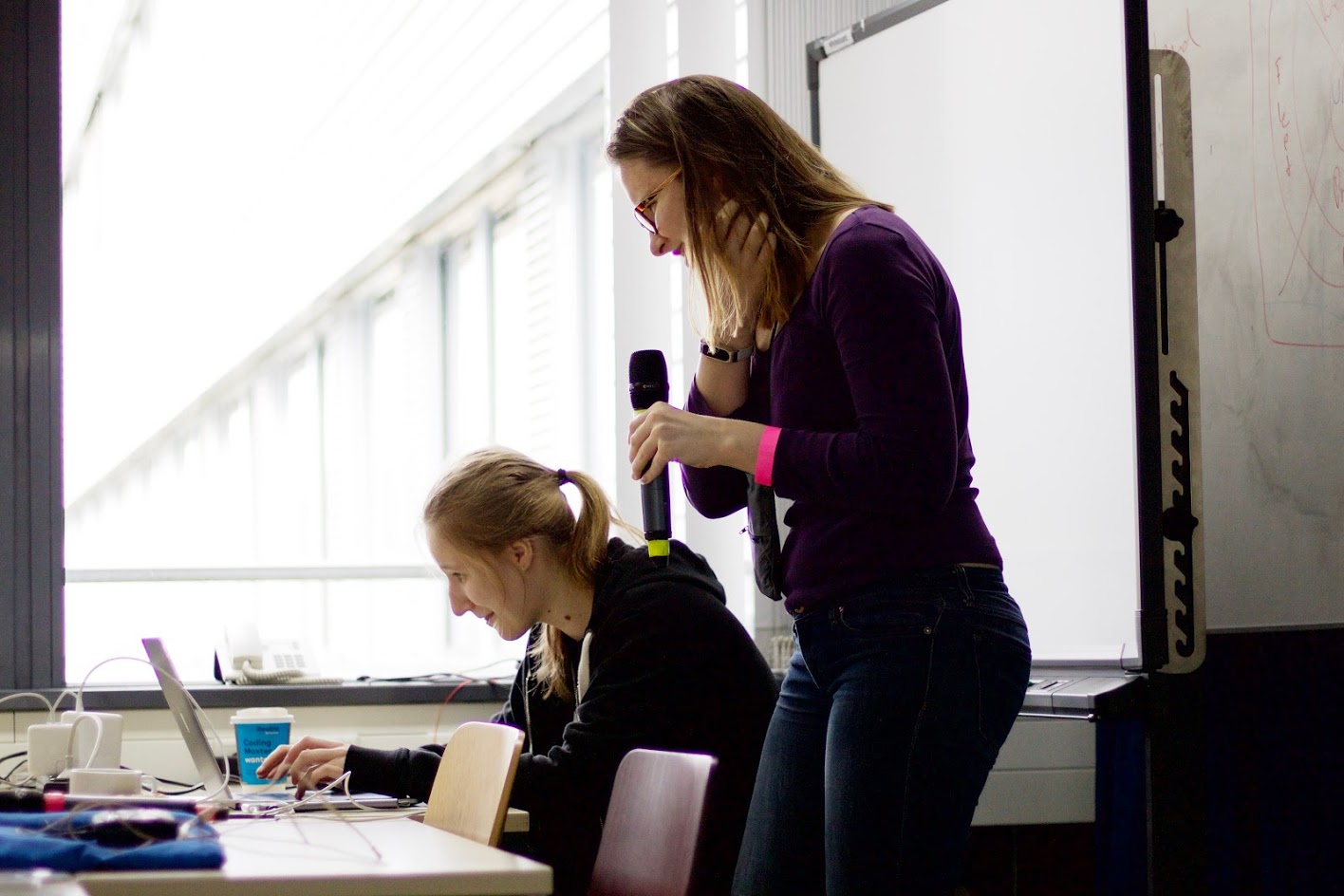
This year, the school was held for a week, not one and a half, but the program still turned out to be quite saturated. On Monday, in addition to presenting projects, there was a tour of the Microsoft office in Munich. And on Tuesday, they added an excursion to a small Zeiss office in Munich, showed several units for measuring the optics of parts: a large X-ray to detect manufacturing inaccuracies and a piece that allows measuring small parts very accurately by conducting a probe.
On Thursday there was a big trip to Oberkochen, where Zeiss headquarters is located. Combined a lot of activities: hiking, and an intermediate presentation to customers and a party.
On Sunday, after the final presentation of the projects, an excursion to the BMW museum was organized in front of the customers, after which the participants spontaneously organized a walk around Munich. In the evening - a farewell dinner.
Anna Nikiforovskaya (3 bachelor course): We went to Oberkochen very early. For school participants a bus was ordered directly from the hotel. The main office of Zeiss is located in Oberkochen, so not only the “customers” who worked directly with us, but also someone more important, looked at the preliminary presentations of our work. First, we had a tour of the office - from the history museum, where we were shown how the optics industry changed to Zeiss and after Zeiss, to the actual workplaces, where we saw a variety of devices for measuring / checking some details and how people work with them . There, almost everything is protected by the NDA and cannot be photographed. And in the end we were even shown a factory where huge machines like tomographs are manufactured.
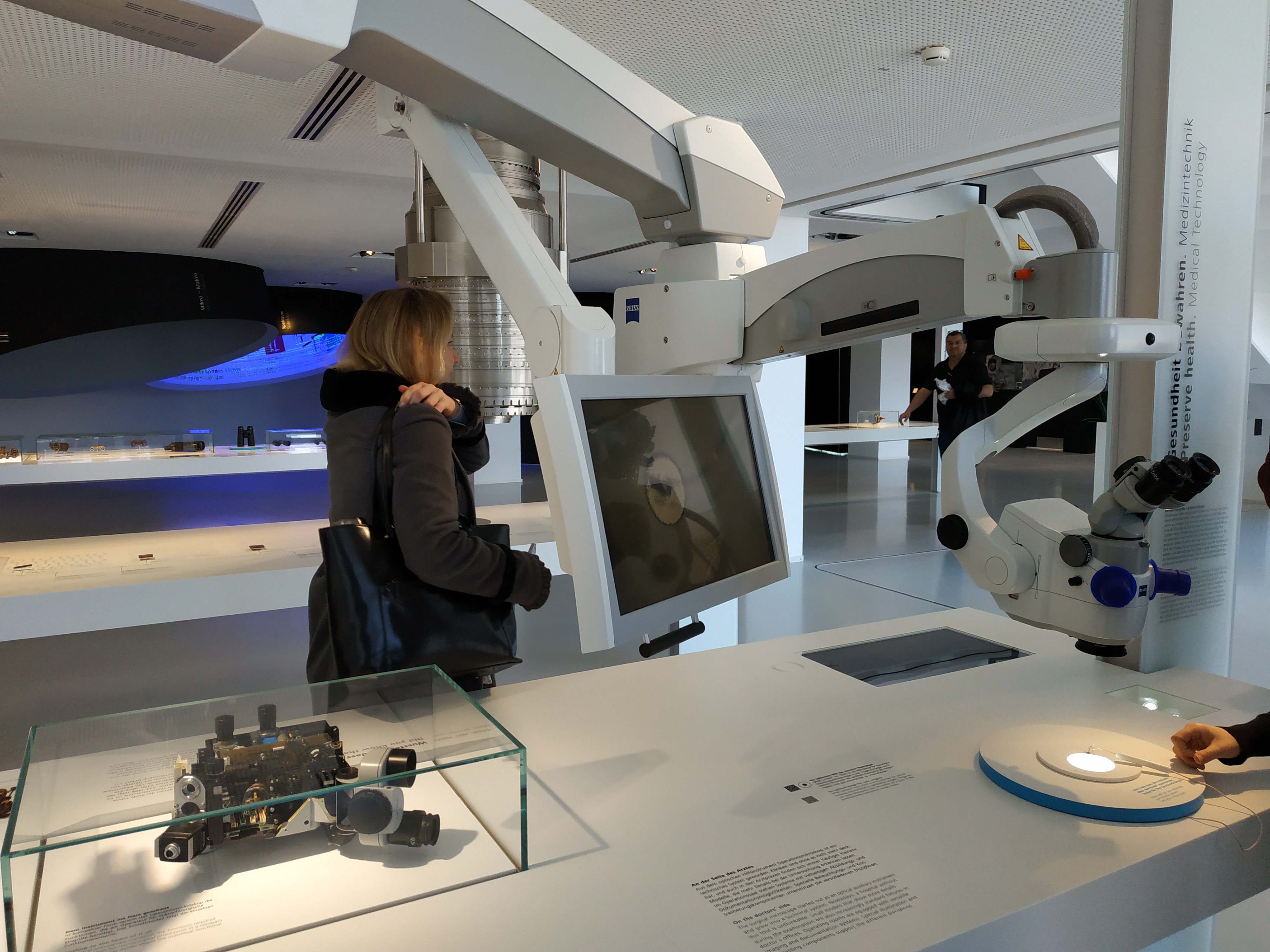
After the tour there was a good lunch with the staff, and then the presentations themselves. After the presentations, we went to climb a not very high mountain, on top of which was waiting for a cafe, completely filmed for us. It was possible to take everything until food and drinks were out of the cafe. And there was a tower from which a cool view was opened.
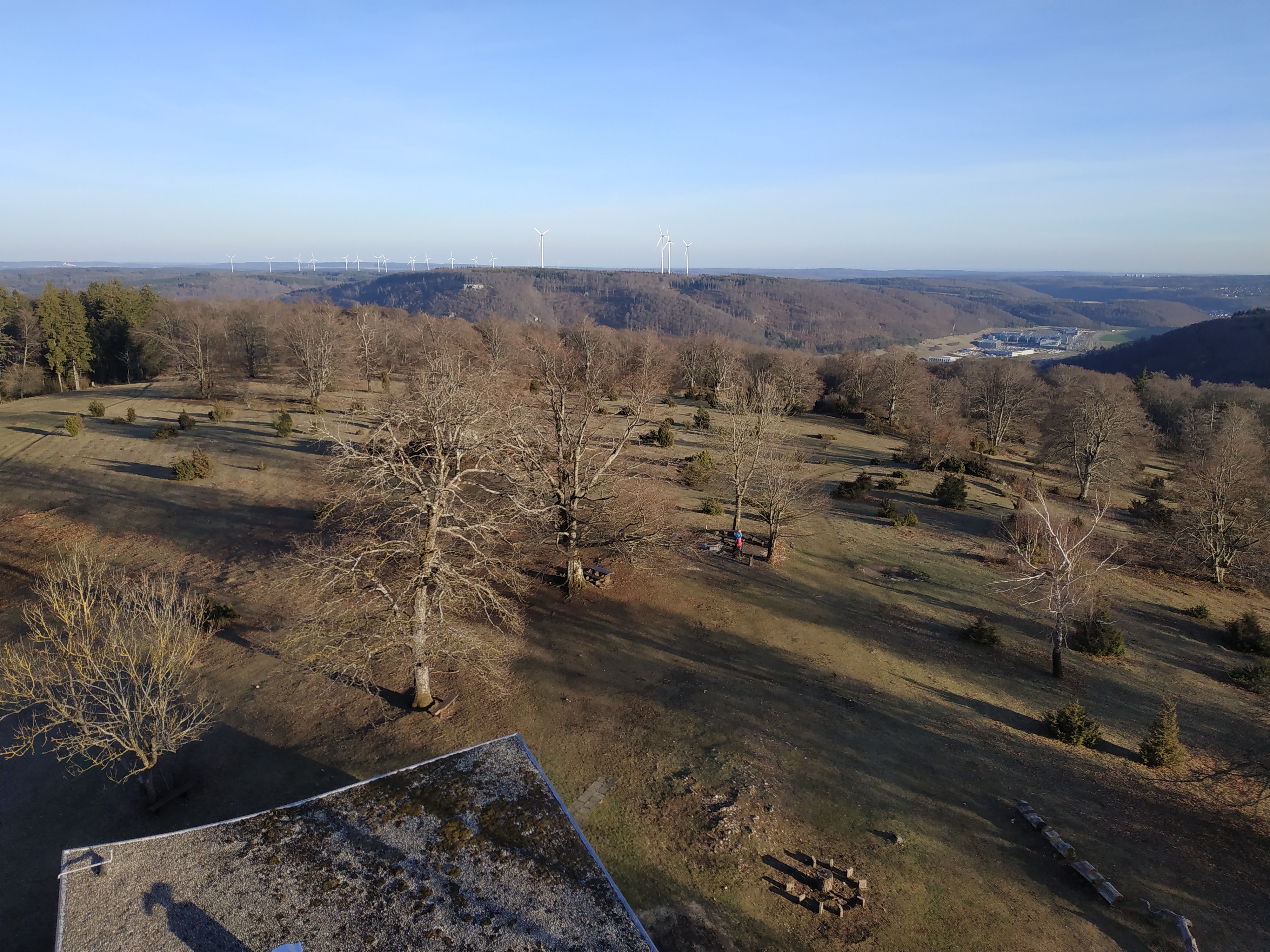
Vsevolod Stepanov (1 course of the magistracy): In order for us to play around with the data, the local professor gave us the data for the year from his Tesla. And then, under the pretext of “Let me show you Tesla live now,” he rolled us on it. There was also a slide from the fourth floor to the first. It became boring - I went down, took a rug, got up, rolled down, laid down a rug.
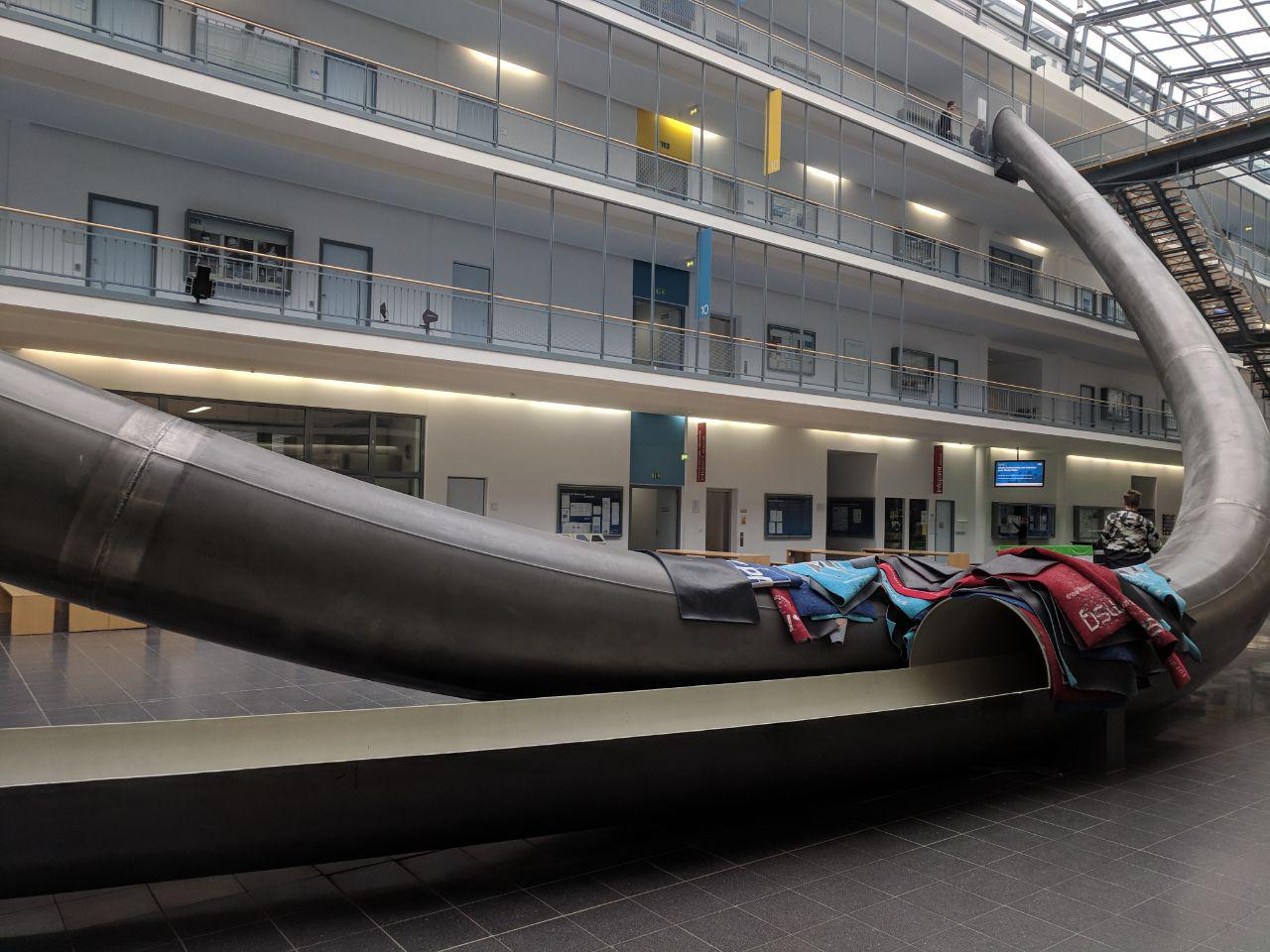
Anna Nikiforovskaya (3 bachelor course): Dating is always very cool. Acquaintance with interesting people is twice as steep. Acquaintance with interesting people, with whom you can also work together - coolly triple. Well, you understand, man is a social being, and programmers are no exception.
Anna Nikiforovskaya (3 bachelor course): It was fun, everything could be asked and clarified. And also the tradition of the Germans to knock on the tables to lecturers: it turns out they have decided to separate the speech of the academicians from all the others. And a person from an academic field (lecturer, professor, senior student, etc) is taken to knock on the table as a sign of approval / thanks for the lecture. The rest (representatives of companies, ordinary people, actors in the theater) decided to applaud. Why is that? One of the Germans, as a joke, said: “Well, just when the lecture ends, everyone takes things away with one hand, so clapping is not convenient.”
Vsevolod Stepanov (1 course of the magistracy): It is interesting that among the participants were not only programmers, but also, for example, robotics. Although all projects and the school as a whole are coding.
There was also quite good feedback in terms of presentations. It was especially useful to those who were not tortured with this every semester during the entire bachelor's program.
Nadezhda Bugakova (1 course of the magistracy): poking in AR was fun. And I also have a cool application on the phone that I can show.
The organizers paid for almost everything: flight, living two stops from the university, where the main work went, meals. Breakfast - in the hotel, lunch - at the university, dinner - either with the organizers in a cafe, or in the office of some company.
At the university, each team had its own room with a board. Sometimes something else: for example, one team had a kicker, and the other team had a lot of free iMacs that could be worked for.
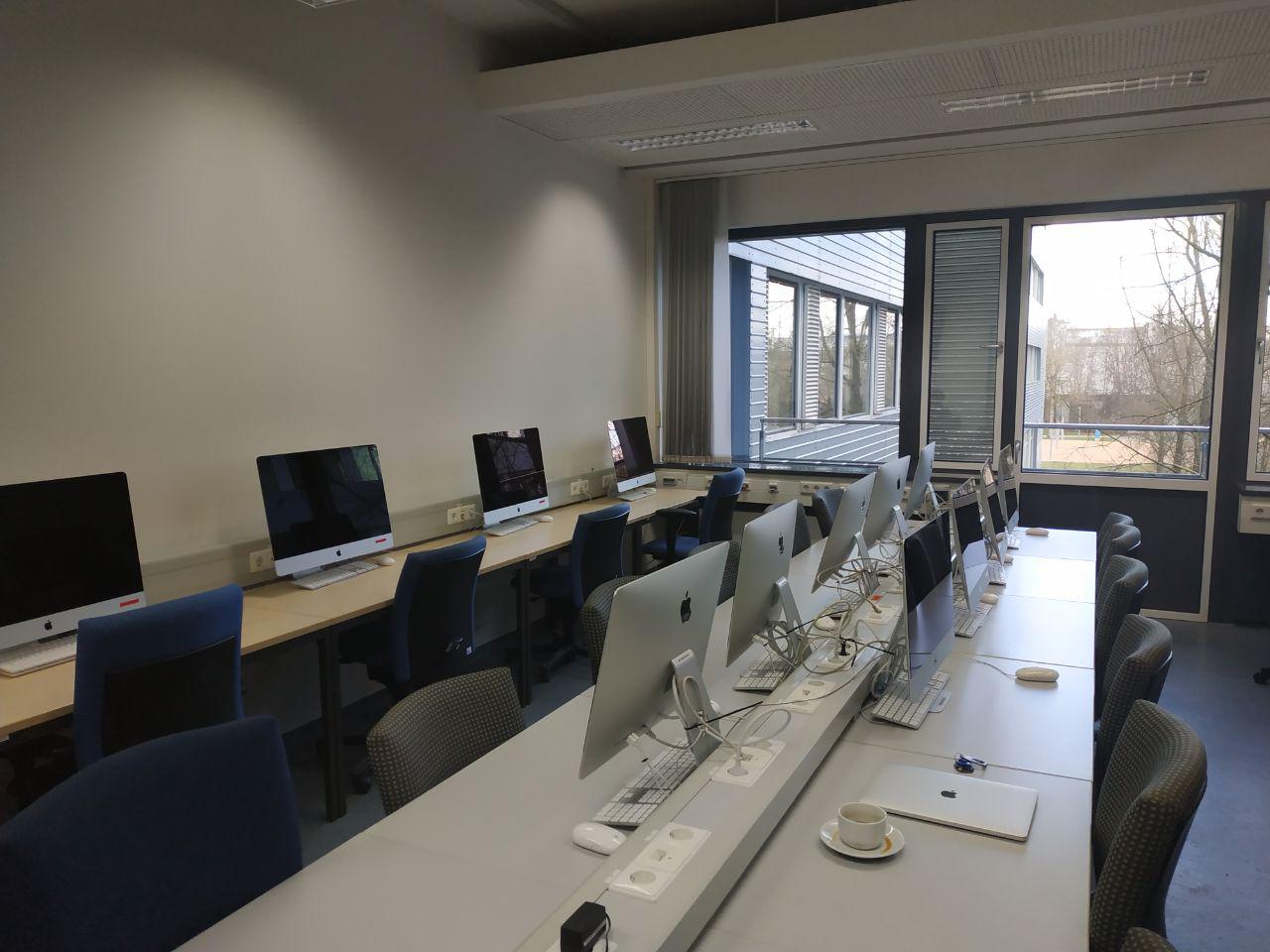
Vsevolod and Nadezhda: We usually worked until 21. There was a 24/7 room with lemonade and 3-4 times a day there were brought nishtyaki (sandwiches, bretzels, fruit), but it was eaten pretty quickly.
Vsevolod and Nadezhda: To all bachelor-programmers! It is worth knowing English, but it is a wonderful experience. You can try all sorts of fancy stuff.
Anna Nikiforovskaya (3 bachelor course): Do not be afraid if it seems to you that you do not have enough knowledge, experience, anything. At JASS, there were people with a wide variety of backgrounds, from the first to the fifth year, with different work experience and different experiences of hackathons / olympiads / schools. As a result, the teams were very well formed (in any case, mine is accurate). And everybody did something with us and everybody learned something.
Yes, you can learn something new, try your hand at accelerated development, see how you open up in a limited time, and be impressed that you can do so much in a short time. In my opinion, at the same time, compared to olympiads or ordinary hackathons, the level of stress and haste is greatly reduced. So there is surprise and pleasure from what has been done, but there is no anxiety and other things. And I think that's great. For myself, for example, I found out that I can notice if the work is distributed in a team is somehow wrong and even contribute to correcting it. I consider this to be my own small victory in the field of communication and leadership skills.
Communication with people is also a very cool part. Do not worry if you think that you do not know English well. If you are engaged in programming, then surely you have to read a lot of English literature. So if you lack the communication skills, then a full immersion in the English-speaking environment will teach you this. Our team had people who were initially not confident in their knowledge of English and were constantly worried that they had missed something or didn’t say so, but by the end of the school they were already quietly chatting and not just at work.
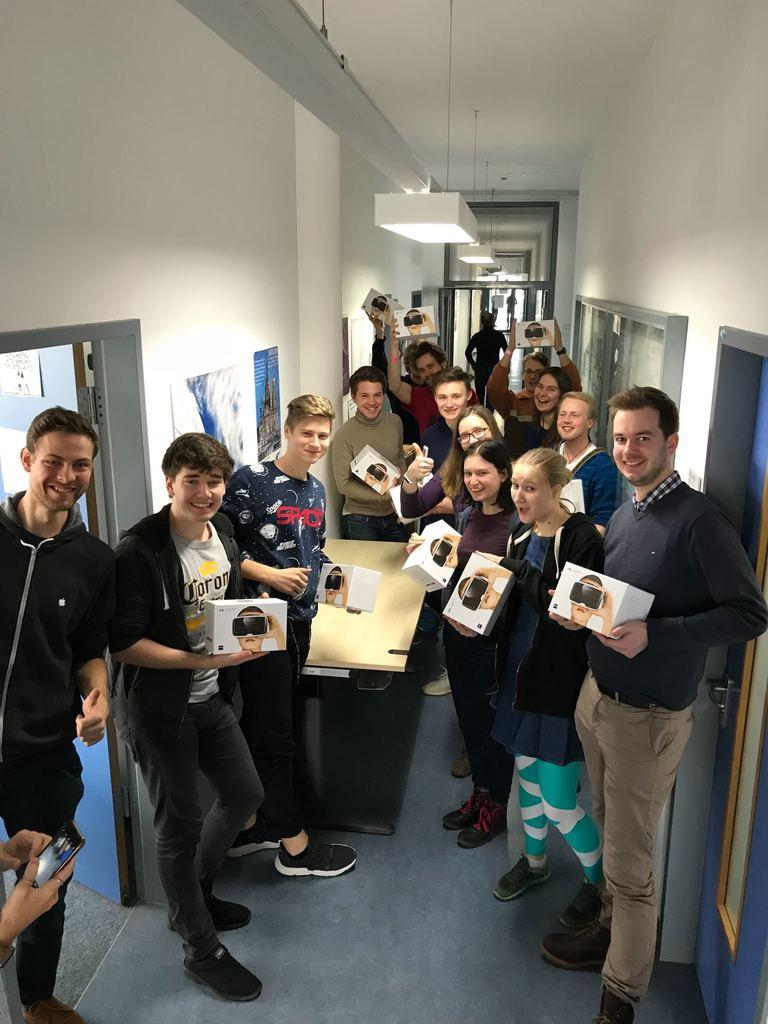

Each year, the sponsoring company (this year - Zeiss) offers ~ 20 students from Germany and Russia several projects, and after a week the teams must present their achievements in these areas. This year, it was necessary either to make video calls with augmented reality for Android, or to invent and test the UI for the predictive maintenance system, or to participate in the secret Project Cataract.
')
All work is in English. The organizers purposely make up mixed teams of Russian and German students for (bes) cultural exchange. Moreover, in even years the school takes place in Russia, and in odd years - in Germany. So this is a great opportunity for students of varying degrees of preparation to get not just work experience, but experience of working with foreigners.
Projects and Goals
Every year the school has a sponsor company that provides projects and mentors for students. This year it was the company Zeiss, which is engaged in high-precision optics (but not only!). At the beginning of the week, representatives of the company (“customers”) presented the participants with three projects for implementation, after which the students broke up into teams and during the week did a proof-of-concept.
The goals of the school are cultural exchanges between students and the opportunity to give novice programmers experience in real-world projects. At school, you do not need to get a fully finished application, the process is more like R & D: all projects are related to the company's activities, and you want to get a proof-of-concept, and such that it is not a shame to show it to managers within the company.
The main differences from the hackathon are: more time to develop, there are excursions and other entertainment, but there is still no competition between the teams. As a result, there is no goal to "win" - all projects are independent.
In each team, in addition to students from different countries, there was also a “leader” - a graduate student who managed the team, distributed tasks and radiated knowledge.
In total, three projects were proposed , each of them will be told by HSE students - St. Petersburg, who are included in the project.
Augmented Reality
Nadezhda Bugakova (1 course of the magistracy) and Natalya Murashkina (3 year undergraduate): We needed to port the video application with augmented reality on Android. Such an application was made as part of another monthly hackathon for iOS and HoloLens, but there was no version for Android. This can be useful for joint discussions of any designed parts: one person turns the virtual part and discusses with the rest.
Predictive Maintenance
Vsevolod Stepanov (1 course of the magistracy): There are expensive robots in production, which are expensive to maintain for maintenance, but repair is even more expensive. The robot is hung with sensors and I want to understand when it makes sense to stop maintenance - this is just a predictive maintenance. You can use machine learning for this, but it takes a lot of markup data. We also need experts who can understand anything on the charts. Our task was to make an application that highlights the alleged anomalies in the data from the sensors and allows the expert and the data scientist to look at them together, discuss and correct the model.
Cataract
Anna Nikiforovskaya (3 bachelor course): unfortunately, we were asked not to disclose details of the project. The description and presentation was even removed from the TUM site , where the rest of the projects are located.
The working process
The school is small and lamp-based: this year about twenty students of various degrees of training participated in the JASS: from the first year of undergraduate to the graduate. Among them were eight people from the Munich Technical University (TUM), four students from the St. Petersburg HSE campus, four more from the ITMO University and one LETI student.
All the work is in English, the teams are specially almost equally composed of German-speaking and Russian-speaking guys. There is no interaction between the projects, except that at the dinner all mixed up. Inside the project, synchronization through Slack and a physical board on which you can glue pieces of paper with tasks.
Schedule for the week looked like this:
- Monday is the day of presentations;
- Tuesday and Wednesday - two days of work;
- Thursday - day of rest, excursions and intermediate presentations (customer's review), so that you can discuss the direction of movement with customers;
- Friday and Saturday - two more days of work;
- Sunday is the final presentation with dinner.
Nadezhda Bugakova (1st year of graduate school): Our working day was like this: in the morning we come and stand up, that is, everyone tells what they have done in the evening and plan to do it in the afternoon. Then we work, after lunch - another standap. Very encouraged the use of boards with pieces of paper. Our team was more than the others: seven students, a leader, plus we often had a customer hanging out (he could ask questions on the subject area). Often we worked in pairs or even triples. We also had a person who developed the original iOS application.

Vsevolod Stepanov (1 course of the magistracy): In a sense, SCRUM was used: one day - one sprint, two stand-ups per day for synchronization. Participants had mixed opinions on effectiveness. Some (including me) thought it was too much talk.
On the first day after the presentations, we discussed the plan, communicated with the customer, tried to figure out what to do. Unlike the Nadi team, the customer did not interact with us during the project. And the team was smaller - 4 students.
Anna Nikiforovskaya (3rd year undergraduate course): In fact, the rules in teams are not exactly that strictly followed. Initially, we were given a lot of instructions on holding stand-ups, a la: everything in a circle, always standing, saying “I promise”. In reality, my team did not adhere to strict rules and stand-ups were carried out not because it is necessary, but because there are many of us, and we need to understand who does what, synchronize efforts, and so on. I had a feeling that we had a natural discussion of progress and the project.
In my project, the customer understood nothing about programming, but understood only in optics. This turned out to be very cool: for example, he explained to us what the brightness of the light and the exposure are. He was very involved in throwing metrics and ideas. When developing, we constantly showed him an intermediate result and received instant feedback. And with the technical side the leader helped us a lot: practically no one worked with two popular technologies in the team, and the leader could tell about it.
Presentation of results
In total there were two presentations: in the middle of the school and at the end. Duration - 20 minutes, then questions. On the eve of each presentation, the participants chased the performance before the professor from TUM for training.
Vsevolod Stepanov (1 course of the magistracy): Since our presentations could show managers, it was important to focus on possible usage scenarios. In particular, each of the teams at the presentation gash some more software theater: live showed how development can be used. Our team eventually made a prototype of a web application, which was shown to the managers of UI / UX, they were glad.
Nadezhda Bugakova (1 course of the magistracy): We managed to make a picture in AR and the connection between the phones so that one person could turn the object, and the other - watch it in real time. Transmit sound, unfortunately, did not work.
Interestingly, the team was forbidden to put the same speaker on both customer's review (presentation in the middle) and the final presentation, so that more participants had the opportunity to speak.

Non-working process and impressions
This year, the school was held for a week, not one and a half, but the program still turned out to be quite saturated. On Monday, in addition to presenting projects, there was a tour of the Microsoft office in Munich. And on Tuesday, they added an excursion to a small Zeiss office in Munich, showed several units for measuring the optics of parts: a large X-ray to detect manufacturing inaccuracies and a piece that allows measuring small parts very accurately by conducting a probe.
On Thursday there was a big trip to Oberkochen, where Zeiss headquarters is located. Combined a lot of activities: hiking, and an intermediate presentation to customers and a party.
On Sunday, after the final presentation of the projects, an excursion to the BMW museum was organized in front of the customers, after which the participants spontaneously organized a walk around Munich. In the evening - a farewell dinner.
Anna Nikiforovskaya (3 bachelor course): We went to Oberkochen very early. For school participants a bus was ordered directly from the hotel. The main office of Zeiss is located in Oberkochen, so not only the “customers” who worked directly with us, but also someone more important, looked at the preliminary presentations of our work. First, we had a tour of the office - from the history museum, where we were shown how the optics industry changed to Zeiss and after Zeiss, to the actual workplaces, where we saw a variety of devices for measuring / checking some details and how people work with them . There, almost everything is protected by the NDA and cannot be photographed. And in the end we were even shown a factory where huge machines like tomographs are manufactured.

After the tour there was a good lunch with the staff, and then the presentations themselves. After the presentations, we went to climb a not very high mountain, on top of which was waiting for a cafe, completely filmed for us. It was possible to take everything until food and drinks were out of the cafe. And there was a tower from which a cool view was opened.

What else do you remember?
Vsevolod Stepanov (1 course of the magistracy): In order for us to play around with the data, the local professor gave us the data for the year from his Tesla. And then, under the pretext of “Let me show you Tesla live now,” he rolled us on it. There was also a slide from the fourth floor to the first. It became boring - I went down, took a rug, got up, rolled down, laid down a rug.

Anna Nikiforovskaya (3 bachelor course): Dating is always very cool. Acquaintance with interesting people is twice as steep. Acquaintance with interesting people, with whom you can also work together - coolly triple. Well, you understand, man is a social being, and programmers are no exception.
And what was remembered for work?
Anna Nikiforovskaya (3 bachelor course): It was fun, everything could be asked and clarified. And also the tradition of the Germans to knock on the tables to lecturers: it turns out they have decided to separate the speech of the academicians from all the others. And a person from an academic field (lecturer, professor, senior student, etc) is taken to knock on the table as a sign of approval / thanks for the lecture. The rest (representatives of companies, ordinary people, actors in the theater) decided to applaud. Why is that? One of the Germans, as a joke, said: “Well, just when the lecture ends, everyone takes things away with one hand, so clapping is not convenient.”
Vsevolod Stepanov (1 course of the magistracy): It is interesting that among the participants were not only programmers, but also, for example, robotics. Although all projects and the school as a whole are coding.
There was also quite good feedback in terms of presentations. It was especially useful to those who were not tortured with this every semester during the entire bachelor's program.
Nadezhda Bugakova (1 course of the magistracy): poking in AR was fun. And I also have a cool application on the phone that I can show.
Living conditions
The organizers paid for almost everything: flight, living two stops from the university, where the main work went, meals. Breakfast - in the hotel, lunch - at the university, dinner - either with the organizers in a cafe, or in the office of some company.
At the university, each team had its own room with a board. Sometimes something else: for example, one team had a kicker, and the other team had a lot of free iMacs that could be worked for.

Vsevolod and Nadezhda: We usually worked until 21. There was a 24/7 room with lemonade and 3-4 times a day there were brought nishtyaki (sandwiches, bretzels, fruit), but it was eaten pretty quickly.
Who would you recommend?
Vsevolod and Nadezhda: To all bachelor-programmers! It is worth knowing English, but it is a wonderful experience. You can try all sorts of fancy stuff.
Anna Nikiforovskaya (3 bachelor course): Do not be afraid if it seems to you that you do not have enough knowledge, experience, anything. At JASS, there were people with a wide variety of backgrounds, from the first to the fifth year, with different work experience and different experiences of hackathons / olympiads / schools. As a result, the teams were very well formed (in any case, mine is accurate). And everybody did something with us and everybody learned something.
Yes, you can learn something new, try your hand at accelerated development, see how you open up in a limited time, and be impressed that you can do so much in a short time. In my opinion, at the same time, compared to olympiads or ordinary hackathons, the level of stress and haste is greatly reduced. So there is surprise and pleasure from what has been done, but there is no anxiety and other things. And I think that's great. For myself, for example, I found out that I can notice if the work is distributed in a team is somehow wrong and even contribute to correcting it. I consider this to be my own small victory in the field of communication and leadership skills.
Communication with people is also a very cool part. Do not worry if you think that you do not know English well. If you are engaged in programming, then surely you have to read a lot of English literature. So if you lack the communication skills, then a full immersion in the English-speaking environment will teach you this. Our team had people who were initially not confident in their knowledge of English and were constantly worried that they had missed something or didn’t say so, but by the end of the school they were already quietly chatting and not just at work.

Source: https://habr.com/ru/post/450170/
All Articles